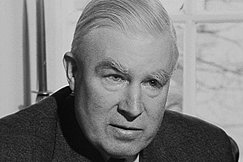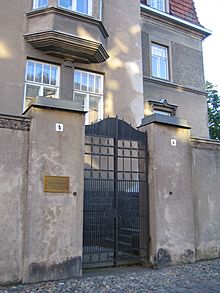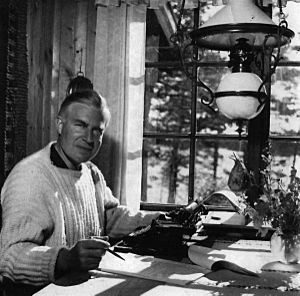Georg Henrik von Wright facts for kids
Quick facts for kids
Georg Henrik von Wright
|
|
|---|---|

von Wright in 1972
|
|
| Born | 14 June 1916 |
| Died | 16 June 2003 (aged 87) Helsinki, Finland
|
| Education | University of Helsinki (1934–1937, 1939–1941; PhD, 1941) University of Cambridge (graduate student, 1939) |
| Era | 20th-century philosophy |
| Region | Western philosophy |
| School | Analytic philosophy |
| Institutions | University of Cambridge University of Helsinki Cornell University |
| Academic advisors | Eino Kaila |
| Doctoral students | Jaakko Hintikka |
|
Main interests
|
Modal logic, philosophy of action, philosophy of language, Epistemology, philosophy of science |
|
Notable ideas
|
Deontic logic Myth of Progress |
|
Influenced
|
|
Georg Henrik von Wright (Swedish: [ˈjěːɔrj ˈhɛ̌nːrɪk fɔn ˈvrɪkːt]; 14 June 1916 – 16 June 2003) was a Finnish philosopher.
Biography
G. H. von Wright was born in Helsinki on 14 June 1916 to Tor von Wright and his wife Ragni Elisabeth Alfthan.
On the retirement of Ludwig Wittgenstein as professor at the University of Cambridge in 1948, von Wright was elected to his chair at the age of 32. He published in English, Finnish, German, and Swedish, belonging to the Swedish-speaking minority of Finland. Von Wright was of both Finnish and 17th-century Scottish ancestry, and the family was raised to nobility in 1772.
Work
Von Wright's writings come under two broad categories. The first is analytic philosophy and philosophical logic in the Anglo-American vein. His 1951 texts An Essay in Modal Logic and "Deontic Logic" were landmarks in the postwar rise of formal modal logic and its deontic version. He was an authority on Wittgenstein, editing his later works. He was the leading figure in the Finnish philosophy of his time, specializing in philosophical logic, philosophical analysis, philosophy of action, philosophy of language, epistemology, and the close study of Charles Sanders Peirce.
The other vein in von Wright's writings is moralist and pessimist. During the last twenty years of his life, under the influence of Oswald Spengler, Jürgen Habermas and the Frankfurt School's reflections about modern rationality, he wrote prolifically. His best known article from this period is entitled "The Myth of Progress" (1993), and it questions whether our apparent material and technological progress can really be considered "progress" (see Myth of Progress).
Awards
In the last year of his life, he was awarded several honorary degrees, including one by the University of Bergen. He also was awarded the Swedish Academy Finland Prize in 1968.
See also
 In Spanish: Georg Henrik von Wright para niños
In Spanish: Georg Henrik von Wright para niños



